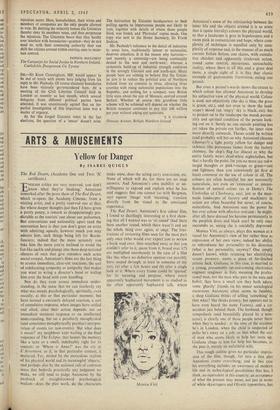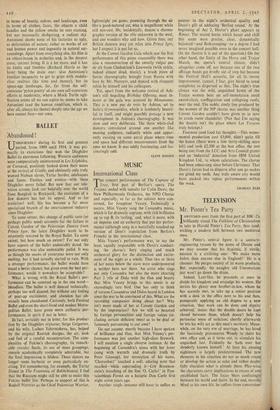'To the funeral, sir.'
IT is no criticism of a good writer to find his life's work contained in a few scenes, a few sentences even, from a great one. To say that most of the best things in the ten Simenons now reissued by Penguins* can be discovered, although to a far higher degree of terror, hysteria and plain farce, in the police interviews of Crime and Punishment is not to detract from the achievement of the creator of Maigret.
Every good detective has a victim out hunting for him, working with equal zeal towards the moment of conviction. This deep urge, which led Dr. Stephen Ward to communicate so zealously with the authorities, and Timothy Evans to pour out his heart to the ever-sympathetic Inspector Black, may be the basis of our cosy, removed, but finally masochistic pleasure in detective stories. Do we secretly long to squirm into the limelight of the dawn questioning in the Quai des Orfevres? Once there, with the
radiators iling, the Inspector's choking tobacco, and Lucas being sent out for cold beer and ham sandwiches from the Brasserie Dauphine, what crimes of passion should we not invent to rivet the wandering attention of the old man behind the desk? How insulted we should be if he grew bored and stumped home to sleep beside the immense thighs of his ageing wife. It would be as bad as owning a hat which had no conceivable interest for Sherlock Holmes.
Nowadays, it is true, the scene has been varied. 007 and Mr. Len Deighton's baby-faced, flat-voiced delinquent hero are themselves hap- hazard crooks, seeking out the paternal Gold- fingers who will brainwash, thump or merely castrate them with elaborately contrived bits of machinery. Maigret could have no sympathy for these palm-sweating upholders of law and order, itchy for punishment. With him the parts are clearly defined, and he clings firmly to the kind of role played with almost equal success by Prospero, God the Father and Spencer Tracy. . 'I would like one man, just one to understand me,' the prisoner says in Act of Passion, a non- Maigret story by Simenon, 'and I should like that man to be you.' For the inquisitor to have * MA1GRET'S FAILURE (3S. 6d.), MAIGRET AFRAID (3S. 6d.), MAIGRET IN COURT (2s. 6d.), MAIGRET TAKI A Room (3s. 6d.), MAIGRET IN SOCIETY (3s. 6d.), PEDIGREE (7s. 6d.), THE WIDOWER (3s. 6d.), IN CAsr. ot, EMERGENCY (3s. 6d.), ACT OF PASSION (3s. 6d.). BLACK RAIN (55.),
To which Holmes and Maigret might nod discreet approval, for Maigret has all the virtues of the honest head of a bourgeois family and Madame Maigret's apparent childlessness leaves him free to act as Dad to all the world. His class background is very accurately indicated; old Maigrct was bailiff at the Château de Saint- Fiacre (he is nowhere described, possibly because not even Simenon can manage the father of a father-figure), and this half-servile origin leaves the Inspector with vague prickles of embarrass- ment in the presence of those he considers his social superiors. In one of his rare nightmares he dreams that he is in the mansion of the old Contesse de Saint-Fiacre and finds that his knees are bare and he is wearing shorts. Luckily he wakes to find Madame Maigret making coffee. Unlike Philip Marlow, Maigret would certainly never seduce a duchess; but the poor can seem to him equally remote, pathetic, helpless creatures, bruised and overwhelmed with child- ren, to whom he can extend a grumbling sym- pathy. He would like best to be thought of as a professional man with a humane attitude to- wards the strict rules of his calling.
pictures mentioned by him is a lithograph which had hung in his parents' bedroom; showing a young woman with .a melancholy face, wearing a wide ostrich-feather hat and standing by a lake, the image was considered poetic by Maigret's mother. However, the work embarrassed young Jules Maigret, who felt the lady to be an im- possible creature, 'surrounded by a false poetry.'
He may be moved by the sight of a young stripper strangled outside the Sacrd-Cceur. He may even take a momentary interest in the tight black satin trousers of a witness he questions among her red lampshades and dolls and film stars' confessions; but he is truly addicted only to beer, and food in the little Normandy restaurant, and longs to retire to a house that looks like a presbytery on the Loire. If he ever leaves Madame Maigret's bed it is to sit in the darkness of their marital room, light his pipe and think, with anxious concern, of the criminals closest to his heart.
As for the creator of this archetypal middle- class deity, his industry is so prodigious, and his professionalism so complete, that criticism seems out of place. However, at least two of these books contain long passages of auto- biography which are clear, revealing and written totally without false poetry. In Black Rain, perhaps his best piece of writing, Simenon appears as a child stuck in a small shopkeeper's family in a northern provincial town. The aim- less living quarters behind the drapery counter, the rain, the trams, the powerful women in black dresses, the constant smell of food; all these are described with stifling accuracy. The child plays with his toy animals in a hot upstairs room also occupied by a vast, stinking old aunt. Oppressed by this monstrous relation, whom the family have imported in the hope of an inheritance, the child wanders out into the square and sees a notice offering a reward for the capture of an anarchist, perpetrator of an outrage at the Etoile. In a strange way, under the dark sky, striped with rain, the notice terrifies him. He imagines the square filled with men in caps, slashing the legs of police horses.
'The warm stuffy room with the oil lamp that east a red glow on the floor seemed far away. It seemed to me suddenly that anything might happen, absolutely anything: that all was black, bitter, and cruel, that people were going to fight in the streets and roll in the mud in the most sickening disorder.' So, vividly, the child sees the anarchic world outside: much as the Inspector will look at his criminals with pity, disapproval or disgust, and miss the warm bed with Madame Maigret or a treat of stewed mutton in the Boulevard du Montparnasse. For if there is a criticism to be made of Maigret it is that he has too little of the criminal in him to be, finally, the complete policeman: and this, in a way, may be the limitation of Simenon also. Whilst Porfiry the inquisitor can titter, make bad jokes, act the buffoon, Maigret is hungry, tired, thirsty, but never other than profoundly sensible. And while the greatest crime writers, from Dostoievsky, Dickens and Wilkie Collins, to Conan Doyle communing disastrously with the spirit world, have written from a firm basis of hysteria and morbidity. Simenon has remained as dispassionate as his hero. It is as if, when he took to his typewriter at the age of sixteen and embarked on his 180 novels, the gods decided to give Simenon all the blessings, industry, vast success, a devoted wife to manage his business affairs, and the gift of keeping his readers hypnotised by the turning page. But one thing they denied him. They re- fused to make him even a little mad.
THE
EXPERIENCE
OF
MARRIAGE
13 Catholic Couples Report 12s 6d paper Llis cased







































 Previous page
Previous page